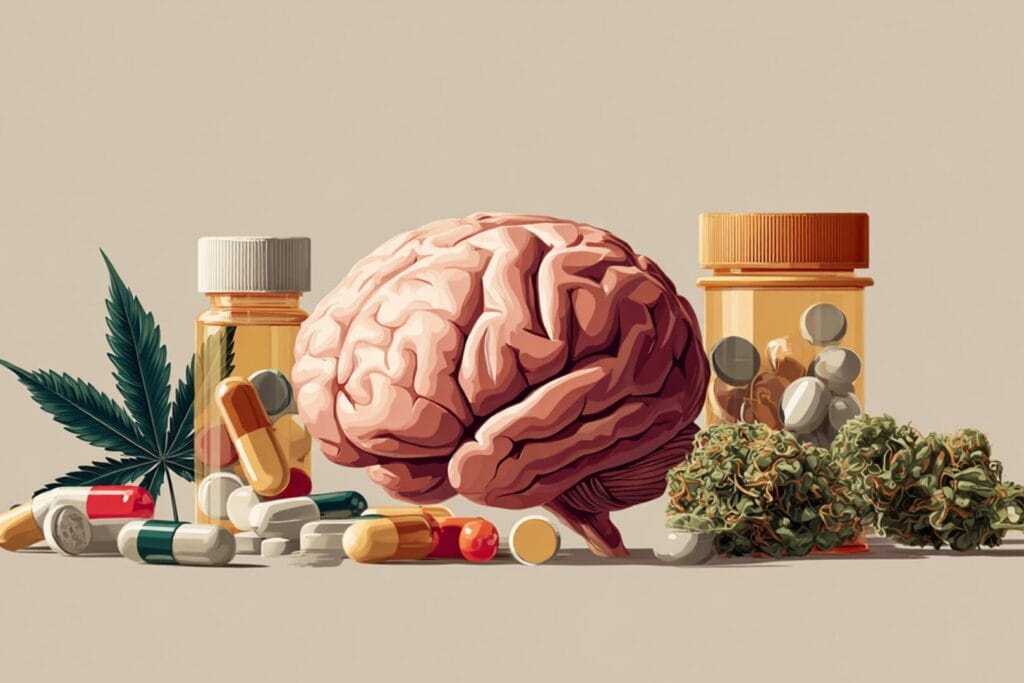When you’re battling cocaine or methamphetamine addiction, you will likely need more than willpower to overcome it. Cocaine and meth are both very addictive stimulants, and they can take a severe toll on your physical, emotional, and social life. When you recognize the signs you or a loved one need residential treatment, it becomes a critical step toward recovery.
Cocaine Addiction
Cocaine addiction is a complex disorder that is defined by an uncontrollable urge to use the drug despite the consequences it has on your health, social functioning, and relationships.
When consumed, cocaine raises your dopamine levels. Dopamine is a neurotransmitter linked with reward and pleasure. Typically, dopamine will recycle back into the cell from which it was released, which turns off the signals between nerve cells. Cocaine, however, prevents the dopamine from being reabsorbed. That means large amounts of it will build up in the space between nerve cells, stopping normal communication.
The dopamine flood is why cocaine makes you feel high, and it also causes addictive effects.
Cocaine addiction signs can be physical, psychological or behavioral. Over time, tolerance usually develops, so you’ll consume larger amounts to get the same high.
The cocaine addiction cycle usually starts with recreational use, which can escalate to regular use, then dependence and addiction.
Treating cocaine addiction usually includes a combination of medical detox, behavioral therapy, support group participation and counseling.
Meth Addiction
Methamphetamine is a stimulant impacting the central nervous system and is highly addictive. Also known as meth, crystal meth or ice, it’s usually smoked, snorted or ingested.
Similar to cocaine, it works by increasing the amount of natural dopamine in your brain and stimulating your brain cells. The result is enhanced mood and body movement, an intense rush of pleasure, and high energy levels and alertness. However, it also causes detrimental changes to the function and structure of the brain, especially in areas related to memory and emotion.
Meth addiction tends to involve a rapid transition from pleasure to compulsive use. As you build tolerance, you need increasingly large doses to feel the effects. The cycle of addiction to meth is hard to break because of the strong cravings and withdrawal symptoms it produces.
What Is Residential Treatment?
Residential treatment is also called inpatient rehab, and it’s an intensive approach to treating severe addictions, mental disorders or both. During inpatient rehab, you live at the facility for a period of time. How long exactly will depend on your needs and treatment plan, but it can often range from weeks to months.
Some of the features of residential treatment include:
- Structured environment: Residential treatment is highly structured, and your days include various therapeutic activities like group sessions, individual therapy and holistic approaches. The structure helps you establish a sense of stability and routine.
- Supervision: A key feature of a residential program compared to outpatient treatment is that you have 24-hour supervision for support and safety at all times. This can be especially important if you’re in the early recovery stages and you’re dealing with the risk of relapse or withdrawal symptoms.
- Medical support: Most residential treatment centers have on-site medical staff, including doctors, nurses and psychiatrists who provide medical detox and ongoing treatment for co-occurring conditions.
- Therapeutic modalities: A residential rehab center will be equipped to provide a range of therapy approaches tailored to treating addiction and underlying mental health issues.
- Peer and community support: Living with others facing similar challenges creates a peer support network. You can share experiences and coping strategies, enhancing the recovery process.
- Aftercare: Most residential treatment programs also focus on aftercare planning so that you can maintain your sobriety and recovery after leaving the facility.
7 Signs You Need Residential Treatment
While outpatient treatment is an option, the following are seven signs you need residential treatment for cocaine or meth addiction:
- Loss of control: One of the primary signs of addiction that would benefit from inpatient treatment is a loss of control over drug use. You might use more of the drug than you intend or use it more frequently, even though you have a desire to cut back or stop.
- Compulsive use and cravings: If you’re experiencing intense urges or cravings for cocaine or meth, it’s a sign of addiction. If your desire to use the drug is your primary focus to the point that it’s disrupting your daily responsibilities and activities, you might consider residential treatment.
- Continued use despite consequences: If you use a drug despite clear harm to your health, employment, relationships or legal situation, it indicates a serious problem requiring inpatient treatment. If you, for example, continue to use the substance even though it’s led to something like an arrest or the breakdown of a relationship, it could suggest you’d benefit from a structured treatment environment.
- Withdrawal symptoms: Withdrawal can include both physical and psychological symptoms that indicate dependence. When you’re dependent on a substance, professional help in a structured environment is usually needed.
- Social isolation: Increasingly isolating from your friends and family and not participating in social activities you once enjoyed can signal you need residential treatment. This usually happens as your lifestyle starts to focus more on drug use.
- Risky behaviors: If your meth or cocaine use is leading to increasingly dangerous behaviors like unsafe sexual practices or driving under the influence, it greatly increases your risk for serious consequences. This underscores the need for intensive treatment in a residential environment.
- Failed attempts to quit: If you’ve repeatedly tried and failed to quit cocaine or meth on your own, it’s an indicator you could benefit from more comprehensive help. Residential treatment can give you the support, structure, and tools to finally break the addiction cycle.
Recognizing the need for a residential rehab program is a necessary step toward recovery when you’re dealing with cocaine or meth addiction. The signs that it might be time for you to seek this level of care include being unable to stop using substances, having physical withdrawal symptoms, and substance use dominating your daily life.
When these issues are comprehensively addressed, residential rehab provides a pathway to recovery, enabling you to rebuild your life and regain control over your health and well-being.
Take the First Step Toward Recovery
If you recognize these signs in yourself or a loved one, know that help is within reach. At San Diego Detox, we provide a supportive environment where healing begins with expert care and compassion. Our evidence-based programs are tailored to meet your unique needs, ensuring a personalized path to recovery. From luxurious amenities to a dedicated team of medical and therapeutic professionals, we are committed to supporting you every step of the way.
Don’t wait to reclaim your life; contact us today to learn more about how we can assist you on your journey to wellness
Frequently Asked Questions
If you experience a loss of control over your use, intense cravings, continued use despite negative consequences (health, legal, relationships), withdrawal symptoms, social isolation, engaging in risky behaviors, or repeated failed attempts to quit — those are key signs that professional treatment may be necessary.
Drugs like cocaine and meth cause a surge in the brain’s dopamine levels by preventing its normal re-absorption. This flood of dopamine disrupts normal brain communication, which contributes to the intense highs and reinforcing addictive patterns.
San Diego Detox offers a comprehensive, personalized approach that can include medical detox, medication-assisted treatment (MAT), individual and group therapy, holistic therapies, and dual-diagnosis support — all aimed at addressing both addiction and any underlying mental health issues.
Because cocaine and meth impact the central nervous system and can cause serious physical and psychological withdrawal symptoms, medical supervision ensures detox is done safely, while monitoring for complications and providing support.







